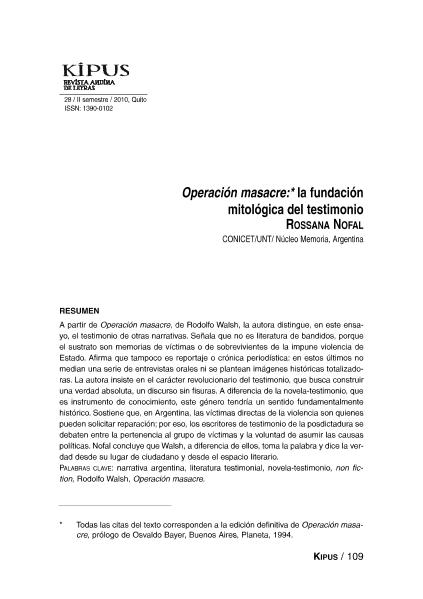Mostrar el registro sencillo del ítem
dc.contributor.author
Nofal, Silvia Rossana

dc.date.available
2017-07-05T14:32:04Z
dc.date.issued
2010-06
dc.identifier.citation
Nofal, Silvia Rossana; Operación masacre: la fundación mitológica del testimonio; Universidad Andina Simón Bolívar; Kipus. Revista Andina de Literatura; 28; 28; 6-2010; 109-132
dc.identifier.issn
1390-0102
dc.identifier.uri
http://hdl.handle.net/11336/19571
dc.description.abstract
A partir de Operación masacre, de Rodolfo Walsh, la autora distingue, en este ensayo, el testimonio de otras narrativas. Señala que no es literatura de bandidos, porque el sustrato son memorias de víctimas o de sobrevivientes de la impune violencia de Estado. Afirma que tampoco es reportaje o crónica periodística: en estos últimos no median una serie de entrevistas orales ni se plantean imágenes históricas totalizadoras. La autora insiste en el carácter revolucionario del testimonio, que busca construir una verdad absoluta, un discurso sin fisuras. A diferencia de la novela-testimonio, que es instrumento de conocimiento, este género tendría un sentido fundamentalmente histórico. Sostiene que, en Argentina, las víctimas directas de la violencia son quienes pueden solicitar reparación; por eso, los escritores de testimonio de la posdictadura se debaten entre la pertenencia al grupo de víctimas y la voluntad de asumir las causas políticas. Nofal concluye que Walsh, a diferencia de ellos, toma la palabra y dice la verdad desde su lugar de ciudadano y desde el espacio literario.
dc.description.abstract
Using Rodolfo Walsh’s Operación Masacre as a starting point, the author draws attention, in this essay, to the testimony in other narratives. She points out that this is no bandits’ literature, since the underlying story is the memoir of victims or survivors of the unpunished violence of the State. She also claims it is neither an article nor a news chronicle: in these, there are no series of oral interviews or there is no outlining of totalizing historical images. The author insists upon the revolutionary nature of testimony, striving to build a definite truth, a discourse with no gaps. In contrast with testimonial novels, which are tools of knowledge, this genre’s meaning would be primarily historical. She also states that in Argentina the direct victims of violence are entitled to ask for retribution; under this consideration, testimony writers of the post-dictatorship period balance themselves between the belonging to the victims’ groups and the will to assume political causes. Nofal concludes saying that Walsh, unlike those authors, takes on a voice and speaks the truth from his position as a citizen and from a libertarian space. KEY WORDS: Argentinean narrative, testimonial literature, testimony-novel, non-fiction, Rodolfo Walsh, Operación Masacre.
dc.format
application/pdf
dc.language.iso
spa
dc.publisher
Universidad Andina Simón Bolívar
dc.rights
info:eu-repo/semantics/openAccess
dc.rights.uri
https://creativecommons.org/licenses/by-nc-sa/2.5/ar/
dc.subject
Testimonio
dc.subject
Memoria
dc.subject
Militancia
dc.subject
Resistencia
dc.subject.classification
Teoría Literaria

dc.subject.classification
Lengua y Literatura

dc.subject.classification
HUMANIDADES

dc.title
Operación masacre: la fundación mitológica del testimonio
dc.type
info:eu-repo/semantics/article
dc.type
info:ar-repo/semantics/artículo
dc.type
info:eu-repo/semantics/publishedVersion
dc.date.updated
2017-05-10T20:33:21Z
dc.journal.volume
28
dc.journal.number
28
dc.journal.pagination
109-132
dc.journal.pais
Ecuador
dc.journal.ciudad
Quito
dc.description.fil
Fil: Nofal, Silvia Rossana. Consejo Nacional de Investigaciones Científicas y Técnicas. Centro Científico Tecnológico Conicet - Tucuman. Instituto de Investigaciones Sobre El Lenguaje y la Cultura. Universidad Nacional de Tucuman. Facultad de Filosofía y Letras. Cátedra de Literatura Argentina. Instituto de Investigaciones Sobre El Lenguaje y la Cultura; Argentina
dc.journal.title
Kipus. Revista Andina de Literatura
dc.relation.alternativeid
info:eu-repo/semantics/altIdentifier/url/http://repositorio.uasb.edu.ec/handle/10644/2887
Archivos asociados
